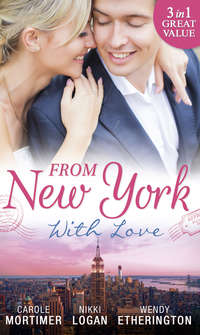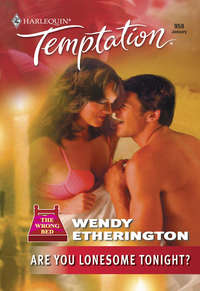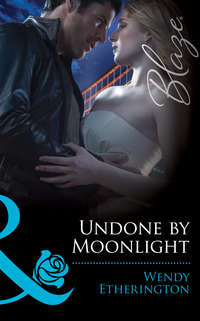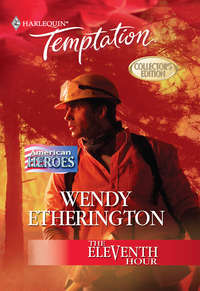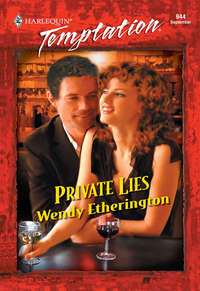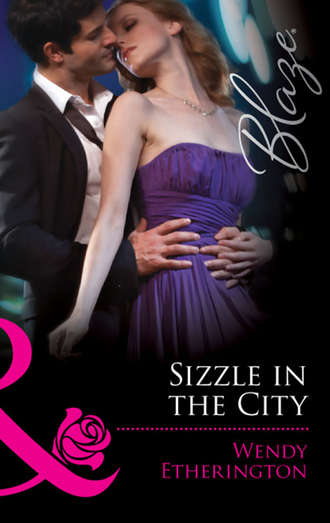
Полная версия
Sizzle in the City

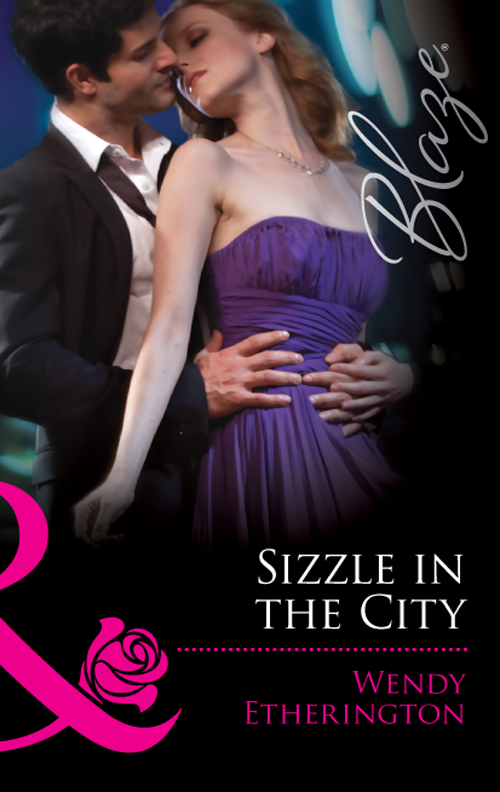
“You’re observant …”
“I like watching you.” Trevor brushed a strand of hair off Shelby’s forehead in a surprising, quick and intimate gesture that made her mouth go dry. “You stand out in a crowd.”
“You, too,” she managed to whisper.
His penetrating stare unnerved her nearly as much as his proximity.
He was related to her enemy.
He shouldn’t fascinate her. She wasn’t one of those women who went after bad boys, hoping to change them. She wasn’t intrigued by danger or darkness.
And more turmoil she certainly didn’t need.
But she didn’t step back. If anything, this endeavor of justice was about standing her ground, standing up for her parents, who couldn’t endure alone.
She wasn’t about to retreat now …
Dear Reader,
Much as the South is my home, my culture—really, my world—I LOVE New York City. At the first step on the pavement, I was astounded by the lights, crowds, sounds and smells. After a few visits, I began to appreciate the mix of cultures, the organised bustle, the glory of the back alley restaurant, and the utter, complete realisation that this is where everything happened.
So what better a place to explore the illusive concept of justice.
The romantic notion of Robin Hood has been a mythical dream of a variety of cultures for several hundred years. The idea of the oppressed and powerless being triumphant over the establishment—no matter how corrupt—is an idea with Blaze-worthy sexiness.
So, here we are.
Shelby and Trevor will introduce you to my little Manhattan gang trying to mix romance and justice. Shelby wants to bring the man who swindled her parents out of their retirement savings to justice, and her best buds are eager to help her. Unfortunately, her enemy is her new lover’s brother. Is getting revenge worth risking the love of her life?
I hope you’ll join me for the entire FLIRTING WITH JUSTICE trilogy. Be sure to look for Victoria’s story, Breathless at the Beach.
Happy reading!
Wendy Etherington
About the Author
WENDY ETHERINGTON was born and raised in the deep South—and she has the fried chicken recipes and NASCAR ticket stubs to prove it. The author of nearly thirty books, she writes full-time from her home in South Carolina, where she lives with her husband, two daughters and an energetic Shih Tzu named Cody. She can be reached via her website, www.wendyetherington.com. Or follow her on Twitter @wendyeth.
Sizzle
in the City
Wendy Etherington

1
“There is no such thing as justice—in or out of court.”
—Clarence Darrow, 1936
The New York Tattletale
April 12
Financial Finagling? by Peeps Galloway, Gossipmonger (And proud of it!)
Hello, fellow Manhattanites! As tax day approaches, all the corporate yuk-yuks are frantically lining up numbers in neat little columns. Yawn. You and I know what really matters in this town—power and popularity. And it seems tycoon wannabe Maxwell Banfield finally has it clutched tightly in his overly tanned hands.
He’s now the proud owner of The Crown Jewel, a popular luxury hotel on West 42nd Street in Midtown. Presumably, he’ll offer the usual glamorous offerings in the hotel’s restaurant, Golden.
But the real jewel in the Crown isn’t the four-star eatery, it’s the thirtieth-floor lounge, where it’s rumored ‘50s movie star Teresa Lawrence once tossed her drink (a very stiff martini) into legendary singer Paul Castono’s face, bringing an end to their tumultuous two-year marriage. In a fit of nostalgia (or perhaps the convenience of the notorious private elevator), the high-flyers of stage and screen still occasionally flock to the joint.
Let’s hope Mr. Big Talker Banfield can keep his lucrative clientele happy this time.
After all, there were some rumors a few years back about a bit of book-diddling that the IRS wouldn’t necessarily approve of. Even if that story was proved unsubstantiated, there’s nothing wrong with repeating it here, is there, kids! Besides, Max has a social cushion and cache many of us would sell our designer bags and shoes for in a heartbeat.
He’s heir apparent to his powerful father, the Earl of Westmore (that’s the title of nobility held by the Banfield family of England and Wales). According to my compats in London, however, the future earl hasn’t exactly lived up to his respected family name, given all his appearances in the tabloids. (And, oh, dear, there’s yet another one!) It’s rumored dear ole Daddy has cut his son off financially. But here he is, doling out cash for a luxury hotel.
Makes one go hmm … huh?
Certainly members of the peerage slithering away from a sticky situation has never happened before in our just and pristine land. So I’m sure those rumors about Max were, well … fraudulent. Wink, wink.
I, your humble squire, just write and wonder. Maybe Max has suddenly got savvy? Maybe he miraculously found thirty million dollars under his sofa cushions? You be the judge, Urbanites. I know I’ll be hitting the streets to find out more.
Keep your ears tuned and your gums flapping!
—Peeps
“WE HAVE TO DO SOMETHING.”
As Shelby Dixon shoved aside the newspaper, she sighed in disgust. “Where’d that crook Banfield get the money to buy a hotel?”
Her best friend Calla Tucker patted her hand in sympathy. “Apparently there are a lot more swindling victims besides your parents.”
Victoria Holmes—her other best friend—narrowed her ice-blue eyes. “For thirty mil, there’s a hell of a lot more.”
Shelby sipped from her coffee mug and knew the bitter taste wasn’t the drink she’d been served at Javalicious, where she and her friends gathered most Sunday afternoons in midtown Manhattan.
Though she was originally from Savannah, Shelby had moved to the city to attend culinary school five years ago, started her own catering business after graduation and had no intention of ever leaving. She loved the vibrancy, the chaos and the struggle of the people and its urban maelstrom of clashing cultures and agendas. She’d adjusted to the size of her meager apartment that contrasted sharply with the extreme wealth of some of the homes she’d visited on the job. She’d learned to groan at the tourists gawking, wandering and clogging the subways, streets and cabs. She’d gotten used to the symphony of horns honking and angry shouts in a variety of languages.
She was home.
Moss dripping from lazy swaying palms was more her parents’ style.
Thanks to Max Banfield and his fraudulent investment scheme, however, their seaside retirement had become a nightmare instead of a dream. Their savings account was shot, their spirits broken, their new condo on the verge of foreclosure and they were looking to their only daughter for salvation.
“He’s got a rich father.” Shelby’s gaze flicked to the gossip article. “Maybe I could appeal to him.”
Victoria shook her head. “You’re chasing a dream. Guys like Max never pay. He’s practically British royalty. He probably has an army of peons running behind him to clean up his messes.”
“Don’t be so negative,” Calla said, exchanging a sharp look with Victoria. “Just because that lawyer you went out with tried to use you for your marketing contacts and clearly wanted to get his hands on your trust fund, that’s no reason to be pissy.”
“Sure it is,” Victoria asserted.
Calla’s eyes turned dreamy as she propped her chin in her palm. “I had a drink in that top-floor lounge last weekend. Very chic. Great lighting, cozy booths and a curving mahogany bar that probably seats fifty.”
“Did Frank Sinatra—the ultracool 1950s version—jump out from behind the potted palm and sing you a tune?” Victoria asked.
Calla blinked. “Well, no.”
Victoria swirled her finger in the air. “Then, whooppee.”
Calla sighed—though not as deeply or hopelessly as Shelby had. “Come to think of it, the bartender was hotter than my date.”
“Could we get back to my crisis here?” Shelby interjected. Normally her friends’ opposing attitudes—positive for the ethereal blonde Calla and darkly realistic for the ebony-haired Victoria—were helpful. Today, they tried her patience. “We all have enough lousy date stories to fill the Hudson. Table the romance chat. I can’t get the cops to do anything about my parents’ case. And if I don’t find a way to get their money back, they’re going to wind up moving in with me.”
“Talk about no romance,” Victoria said sagely.
Calla bit into her scone—one Shelby had made and sold to Javalicious on a weekly basis. She’d spent so much time cultivating relationships with local businesses that they cross-promoted and shared temporary employees and suppliers.
Was all that hard work in jeopardy?
Her parents couldn’t live with her in her one-bedroom apartment, and she couldn’t afford a bigger place, or continue sending them enough money to pay their condo mortgage. She’d already begged the bank for more time, putting up her catering company as collateral. What if she had to liquidate her business and move back home to support her parents?
That was her duty, she supposed, but it would break her heart. There had to be another way.
“How can there be despair and strife when there are delights like this to enjoy?” Calla said, licking blueberry scone crumbs off her lip. “This is your best creation yet, Shel.”
Unfortunately, Shelby couldn’t appreciate the compliment. “I don’t sleep. I bake.”
“Strife?” Victoria narrowed her eyes. “What is this? The Canterbury Tales?”
“If only,” Calla returned. “Then we could call a knight to raise his sword and strike down the tyranny of injustice, rescue the princess from the castle and bring peace and hope to all the land.”
“Darling,” Victoria began, clearly making strides for patience, “you’re a talented travel writer, but surely you’re not thinking about moving into fiction.”
“I could, you know.” Calla nodded for emphasis. “How hard could it be?”
“I’d imagine quite—”
Shelby poked Victoria. “Hang on. Who’s the princess in this story?” she asked Calla.
Calla cocked her head. “Your mother, of course.”
“Why not me?” At the moment, Shelby figured she could use a knight or two to save the day.
“Because you’re the knight,” Calla said as if this were obvious.
Shelby and Victoria exchanged frustrated looks.
“Knives I can handle,” Shelby said finally. “Swords aren’t really my forte.”
“And that chain mail would ruin the body-buffing treatment I got last week,” Victoria added.
“Yeah.” Calla bit her lip. “Maybe you’re right. There has to be a better …” Calla’s eyes sparked with inspiration. “We’ll go Robin Hood.”
Victoria peered into Calla’s mug. “Did you add whiskey?”
Calla wrapped her hands protectively around the ceramic. “I added coffee, creme and caramel. I’m perfectly sober.”
“Yet you suggested we involve Robin Hood in solving Shelby’s parents’ financial crisis,” Victoria reminded her.
Calla scowled. “You brought up The Canterbury Tales.”
Victoria nodded. “Because you started down Fairy Tale Lane.”
“I was helping,” Calla said, an atypical fierceness infusing her voice. “You, however—”
Shelby, holding up her hand, was beginning to feel like a referee. “Back to Robin Hood. Are we talking the costumes or the concept?”
“The concept, of course,” Calla said. “I’m going nowhere in green tights and a short skirt after eating two of these scones.”
“But you’re suggesting we steal my parents’ savings from Max Banfield,” Shelby said slowly.
“Robin Hood didn’t steal,” Calla asserted. “He brought peace and justice to the land.”
“By modern standards he was a vigilante,” Victoria argued.
“Well, yes.” Calla wiped her hands on a napkin. “But he was right, wasn’t he? Fighting against the corrupt establishment? Helping people who’d been wronged and had no means or power of retribution? And I’m not suggesting we steal anything. I simply think we should take the law into our own hands. This investment scheme of Max’s had to have affected a lot of people. We should find them and talk to them. We should band together.”
“Shelby the Caterer and her Unhappy Retirees,” Victoria said sardonically.
“We get proof of his swindling,” Calla insisted.
“We get proof,” Shelby repeated, both skeptical and curious of this obviously crazy idea.
“Sure.” Clearly glad to have an eager audience, she leaned forward. “I’m great at research. How different could this be? We talk to his customers and his former clients. This new hotel gives us the perfect excuse. We could observe him, even interview him. I could pretend I’m doing a story on local entrepreneurs. We gather information and get proof that he’s a lying, swindling creep.”
Victoria’s expression remained passionless. “Something nobody in the entire NYPD has been able to do.”
“Only because they haven’t really tried,” Calla said, tossing a glare in her direction.
Shelby had to admit the idea of seeing that creep Max Banfield led off in handcuffs was appealing. But they all had jobs and businesses to run. Not to mention they had absolutely no authority to go poking around a criminal situation. What if Banfield had diplomatic immunity or something in America? Then the cops couldn’t touch him, and she and her friends would get thrown in the dungeon for pestering him. “I appreciate you trying to help, Calla. But I have to agree with Victoria. I don’t see how a caterer, a travel writer and a PR executive can solve a case the cops can’t.”
Calla stubbornly lifted her chin. “We can. We just have to—”
Victoria held up her hand. “Ladies, there’s an obvious solution to this problem. I’ll loan Shelby’s parents the money to get by.”
Shelby shook her head. “No. No way.” When Victoria looked on the verge of insisting, she added, “They can’t pay back a loan. The money they got from selling their dry cleaning business went to the down payment on the condo.”
“A beachside condo won’t be easy to sell these days,” Calla said in an I-told-you-so kind of voice.
Shelby scowled. “No kidding.”
“Our social lives are in a serious rut,” Calla continued. “We need an adventure to break the monotony.” She paused and grinned. “Plus, when is revenge against a creepy guy not fun?”
At this, even Victoria seemed intrigued.
Apparently, Shelby was staring desperation right in the eye, since the Robin Hood plan suddenly sounded like a viable option.
Victoria drummed her manicured fingernails on the table. “We’ve got one other problem.”
“What’s that?” Shelby asked, tensing.
“Robin Hood was a myth,” Victoria said.
Calla cleared her throat. “Well, yes. That’s a small wrinkle.”
Shelby resisted the urge to drown herself in her latte.
2
“MR. BANFIELD, YOUR brother is on line one.”
Trevor glanced up from the financial report he’d been reading to see his assistant filling his office doorway.
Hands planted on her ample hips, Florence Windemere scowled. “He’s very insistent.”
“I’ll bet.”
Max was, no doubt, caught in yet another mess of his own making. Who else could he call?
“Did he flirt with you again?” he asked Florence.
“Cheeky, that’s what he is. Unprofessional, too.”
Trevor smiled slightly at the flushed indignation of the woman who’d been his childhood governess after Max had gone off to boarding school at age eight—the year of their parents’ divorce. “So was I at one time.”
She drew herself to her full five-foot, one-inch height. “You were simply energetic, maybe a bit precocious and certainly a child. He’s a grown man.”
“He appears to be anyway.”
Florence gave him a sage smile. “There comes a time, my boy, when you have to push the baby bird from the nest.”
“Would you have given up on me?”
“He’s not you.”
“Which I, for one, am thankful. He is my brother, however.”
“Older brother,” Florence reminded him significantly as she retreated from the room.
Trevor understood her implication—the older sibling should be wiser, looking out for the younger. Somehow, almost right from the beginning, his family had been turned backward. And they’d all been paying for that quirk of fate ever since.
Bracing himself, Trevor lifted the phone receiver.
“Know anything about the hotel business?” Max asked him casually.
Way too casually.
Recalling the time Max had asked him about the hot-air-balloon business, only to have his ever-ambitious brother ignore his advice and buy four used ones with the ridiculous dream of them bobbing over and around the skyscrapers of Manhattan and/or Paris, Trevor knew he had to nip this blossoming idea in the bud. “It’s volatile, labor intensive, multifaceted and in no way, shape or form an industry you should be involved in.”
“Ah.” Long pause. “Uh … okay. What’d ya think of that Jets game on Sunday?”
Trevor got a bad feeling in the pit of his stomach.
And not just because the Jets played football and it was the middle of April.
“What’ve you done?” he asked Max.
“Me?” he asked with affronted innocence that was well practiced and generally effective. “Not a thing. Though I did have a spicy dinner with a hottie from Venezuela last night. Maybe she’s got a sister, you could come with us next time.”
Max the Pimping Earl. Lovely. “I can get my own dates, thank you. Did you take Ms. Venezuela to a hotel?”
“No. My apartment.”
“Did you eat in a hotel restaurant last night?”
“Uh, well—Hmm … Let me think.”
He shared genes with this man. It was terrifying.
And since Trevor didn’t have time to wait for the how-can-I-save-my-ass Max thought process to play out, he prompted, “Where did you have dinner?”
“I can’t quite remember the name,” Max said faintly. “It might have been a color.”
“What color?”
“Hmm … red, maybe yellow.”
“Where were you?”
“The Theatre District?”
“You’re not sure?”
“I was half-pissed. We had drinks before at the top-floor lounge.”
The Theatre District was clogged full of hotels. But a hotel with a restaurant whose name was a color—red, maybe yellow—and had a bar on its roof?
“Golden.”
Max coughed.
It was mostly a tourist place, but the hotel had endured for more than fifty years and the lounge had its moments being hip and interesting, depending on the nostalgic whims of the NYC elite.
“Oh, damn. That’s my other line. Gotta go.” Max hung up abruptly but not unexpectedly.
Having flown into New York that afternoon from San Francisco, Trevor had grabbed newspapers at the airport, but other than glancing at the headlines in the cab, and answering a few pending emails on his phone, he hadn’t delved further.
Max, at least in this country, was not front-page news.
An internet search on Max yielded thousands of hits on an article titled “Financial Finagling” in the New York Tattletale. The author’s name was Peeps Galloway.
Talk about cheeky.
“Financial guru?” he muttered aloud as he read. “Since when?”
He had to shut his eyes when he reached the part about The Crown Jewel. Bloody hell, Max owned a hotel.
Clearly, their mother’s most recent husband was gullible as well as rich, as their father had indeed cut off his oldest son financially.
At least publicly.
Trevor forced himself to read the rest, wincing when he read his father’s title. He’d probably be getting a call from his secretary by tomorrow. Maybe even the old man himself. The heir apparent had indeed slithered away from several sticky situations, and yet again, it would no doubt be Trevor’s responsibility to shove the mess under the rug.
He’d officially become his family’s janitor.
Being the second son of the Earl of Westmore—who was related, by some convoluted and ancient way, to George III of England—Trevor had always known he’d have to make his way in the world. Nothing was going to be handed to him.
His brother would one day be the earl, and Trevor was largely superfluous. Like an insurance policy.
Frankly, Trevor had been relieved by his sibling’s departure for boarding school and had blossomed under Florence’s watchful, caring eye, even as Max fell in with a group of arrogant, troublesome boys who thought their future titles made them invulnerable.
The divorce hit him harder than you was a good excuse he got for his brother’s behavior. He worshipped your mother and doesn’t know how to cope without her. Or, Max has the pressure of the title on his shoulders.
During those days Trevor had resented being metaphorically shoved in a drawer and forgotten about, so he’d dreamed of becoming a teacher, then a poet, then a rock star. Thanks to Florence, he eventually learned to play to his advantages—athletic skill, a fair amount of charm, a strong dose of good sense and a trust fund to get virtually any venture started.
So, as his father mourned the loss of his marriage and Max had taken advantage of his distraction, Trevor had decided he’d run his own business. He’d be in control. He’d escape family obligations.
Not so fast, my boy.
Even after he’d left for America in his early twenties, he’d been dragged into Max’s troubles. He made excuses. He’d reasoned with his brother. Apparently, no one else could. When his business became financially successful, he’d bailed out Max of several money crises.
Trevor had always understood his actions reflected on the rest of his family, on the ancestry to which he was forever linked by blood. Max loved parties, women and being important.
There were whispers that Trevor was the better successor to the title. That Max would never grow up. Yet, unless the line of succession was somehow eradicated, they were stuck.
Max was more like their mother—flighty and unpredictable. But while she was kind and generous, Max was inherently selfish. He expected others to pick him up when he fell down. Even at an early age, he managed to blame the crayons on the wall or the snags in the tapestries on his “energetic” little brother.
Yet Trevor and Max were bonded by a single truth—neither of them wanted to become their father. The stoic earl. Distant, but devastated by his divorce.
So Trevor had learned discretion and discipline at the stable hand of Florence. Nobody had to explain his partying the night away with hot women, too many cocktails and getting his picture printed in some trashy rag as a result.
Thirty odd years after their home life had imploded, Max had never learned that lesson.
Maybe they all should have realized that the crayons on the wall would lead to lousy financial and business management, gambling debts and embarrassing questions by peers and friends.
Trevor used to be proud that his father looked to him to help his brother, to coach him out of whatever ridiculous mess he’d landed in. There was no real harm in him—other than to his own family. But wasn’t there a time to push the baby bird from the nest?


